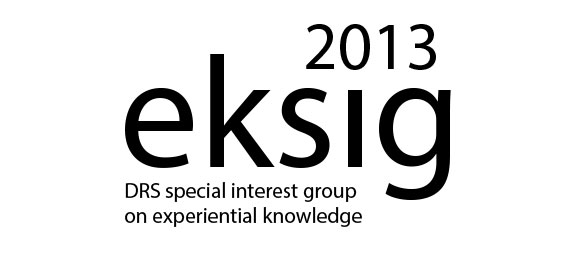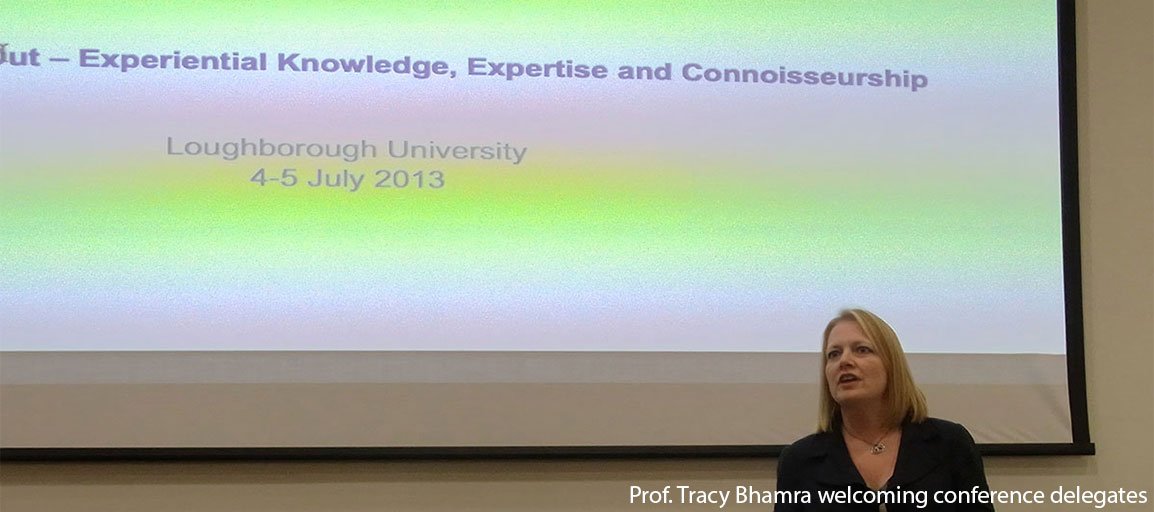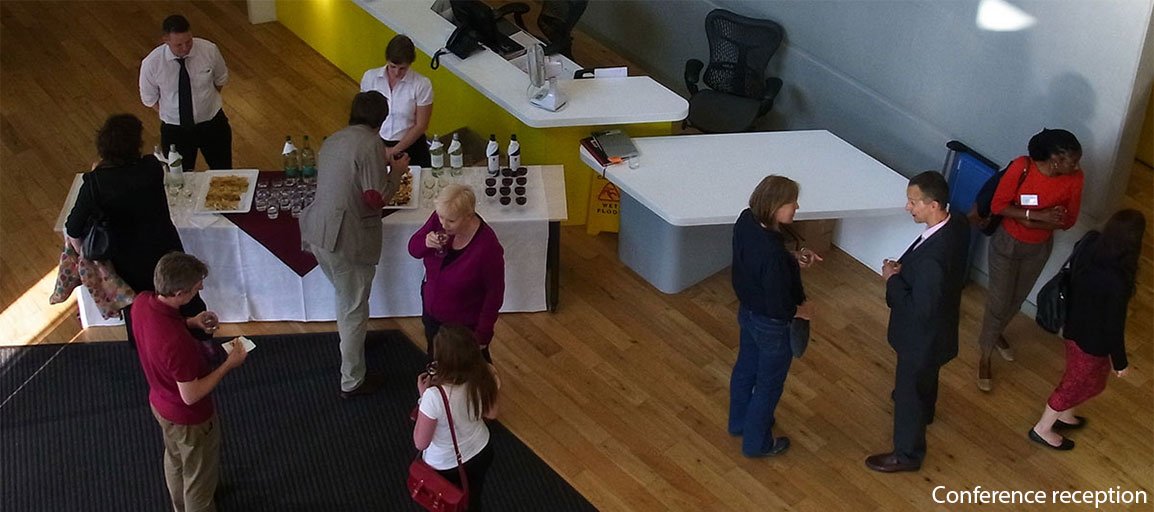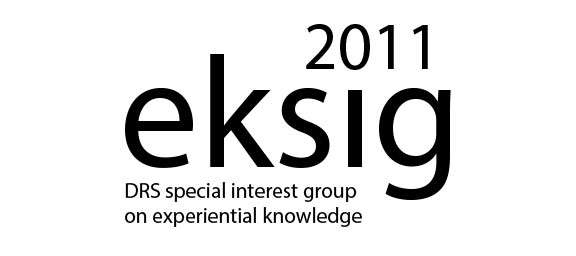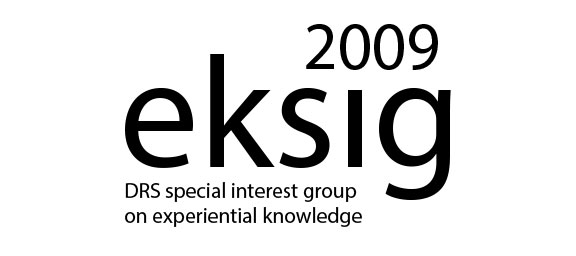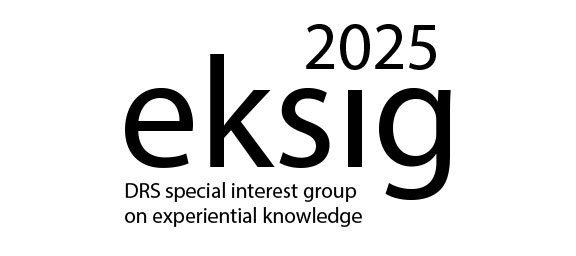EKSIG 2013 Knowing Inside Out - experiential knowledge, expertise and connoisseurship
International Conference of the DRS Special Interest Group on Experiential Knowledge at Loughborough University, 2013
Date: Thursday and Friday, 4–5 July 2013
Venue: Loughborough University, UK
EKSIG 2013 addresses the theme of 'Knowing Inside Out - experiential knowledge, expertise and connoisseurship'.
- Paul Greenhalgh, University of East Anglia, UK
- Janet McDonnell, Central Saint Martins, University of the Arts London, UK
- Michele D. Dickey, Miami University, USA
With the theme 'Knowing Inside Out: experiential knowledge, expertise and connoisseurship', the conference aims to provide a forum for debate about expertise and connoisseurship by professionals and academic researchers, exploring the role and relationship of generating and evaluating new and existing knowledge in the creative disciplines and beyond.
The issue of expertise and connoisseurship has come to the fore in recent years as professionals and scholars from many disciplines negotiate the tension between the explicit justification required by research and the tacit appreciation and judgment that expertise and connoisseurship entail.
Expertise is considered the highest level of skill acquisition and knowledge within professional practice, being based on experience and tacit understanding and an intuitive grasp and judgment of its processes and situations (Dreyfus & Dreyfus 1986). Much expertise operates without conscious effort and the tacit knowledge that sustains expertise is not generally made explicit nor is it easily articulated. Deliberate practice and extended experience result in automaticity and immediate intuitive response. For example, a pianist’s hand movement, a designer’s choice of material, a radiologist’s instant diagnosis, etc.
In contrast, connoisseurship can be defined as the external judgement or ‘the art of appreciation displayed in any realm in which the character, import or value of objects, situations and performances is distributed and variable’ (Eisner 1998: 63), and which relies on experience and tacit knowledge. For example, curators utilise their tacit expertise and connoisseurship together with their explicit knowledge in museology and conservation to make judgements on which artefacts are suitable for collections or exhibitions. This raises the question, for example, how inquiry into the practice of curatorship may accommodate the requirements of the practice of research and how we judge academic and creative output.
In many disciplines, expertise and connoisseurship pervades all parts of practice, including processes, the creation of artefacts and/or other kinds of physical manifestations and finally the interpretation through other professionals, such as curators, critics, historians, gourmets etc. While knowledge and experience generated from within creative and professional practice have extensively been disseminated in the research context as a written text and artefacts, the expertise and connoisseurship of professionals have rarely been considered in this context. However, this seems key to understanding, for example, procedural inquiry, using the role of creative output within any inquiry as an illustration or demonstration of the researcher’s knowledge or any embedded meanings (e.g. concepts, function, user behaviour, etc.). How professionals develop their expertise and connoisseurship and how these forms of tacit judgement facilitate explicit justification in research, including the generation, evaluation and communication of knowledge therefore remains open to questions and debate.
With this conference, we wish to explore the roles of the researcher’s professional knowledge and the different ways in which it can be utilised and communicated within the framework of research. This may include, for example, investigations into the nature, aims, evaluation, and/or necessity of different forms of expertise and connoisseurship as well as modes of communication and exchange for experiential and procedural knowledge.
Questions of interest are for example:- What are the current understandings of expertise and connoisseurship?
- Why might professional expertise be important for any research conduct?
- How can a researcher’s professional expertise and connoisseurship benefit research into that particular discipline, or another?
- How can expertise and connoisseurship be utilised within the framework of research?
- How can we articulate skills which are tacit and embodied within the process of research?
- What frameworks are there to guide the reception and interpretation of professional practices or artefacts within research, for example research exhibitions, performances, etc.?
- What frameworks are there to guide the communication of procedural knowledge
- How can skills in different professional disciplines be shared and/or applicable to one another?
- What differences are there between the articulated first-hand experience of an expert practitioner, that of an amateur and that of a researcher?
- What issues evolve from criteria of research such as repeatability and transferability for the foregrounding of tacit knowledge in research in the creative disciplines?
- What means and methods can be utilised to transfer and replicate tacit knowledge?
- Is connoisseurship involved in knowledge transfer/replication?
- How can the judgmental power of connoisseurship be integrated and utilised within the framework of research?
- What differences/relationships are there between research-driven judgment and judgment driven by connoisseurship?
Conference Organizers
Nithikul Nimkulrat, Loughborough University, UK
Kristina Niedderer, University of Wolverhampton, UK
Mark Evans, Loughborough University, UK
Seymour Roworth-Stokes, Coventry University, UK
- Dreyfus, H. L. and Dreyfus, S. E. (1986). Mind over Machine: the power of human intuition and expertise in the age of the computer. Oxford: Basil Blackwell.
- Eisner, E. W. (1998). The enlightened eye: qualitative inquiry and the enhancement of educational practice. Upper Saddle River, NJ: Merrill.
(Photographs: Erik Bohemia)
